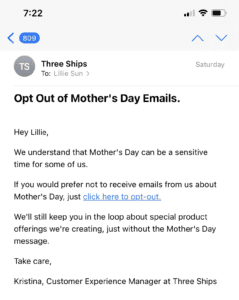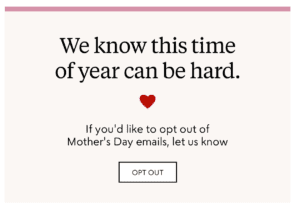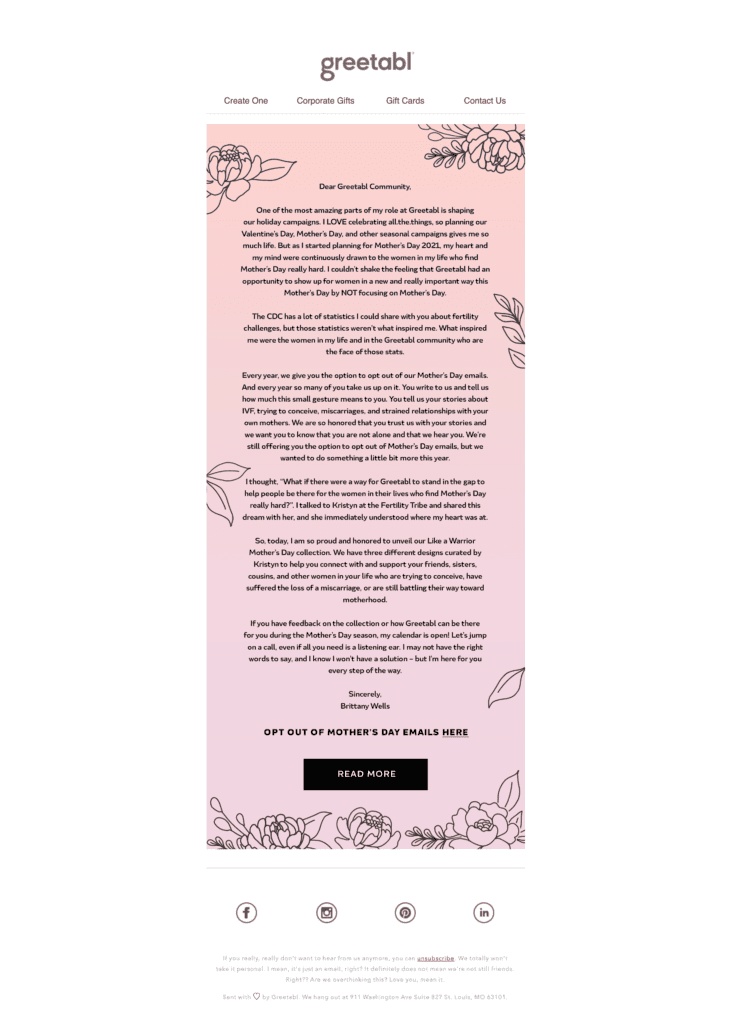About a month before Mother’s Day, Lillie Sun was checking her Twitter feed when she saw that Etsy Inc., a marketplace for handcrafted items and vintage goods, was allowing shoppers to opt out of marketing emails for the holiday, which can be an emotional time of year for some.
Sun, who leads the growth and direct-to-consumer channels for natural beauty brand Three Ships, thought it was a “no-brainer” move and took the idea to her team.
“In my personal life, someone close to me was struggling to get pregnant, and I was very cautious around Mother’s Day with what I was saying to her,” she says. “It was kind of like, ‘Well, if I’m being careful about how I’m talking about it to my friend, that should probably also apply to the 30,000 people we send our emails to.’”
After Sun consulted with the company’s co-founders, who supported testing the new marketing strategy, Three Ships sent out a plain text email from its customer experience manager with a carefully crafted message conveying the company’s empathetic stance. “Our aim was to say, ‘Hey, we know Mother’s Day isn’t a happy holiday for everyone, and we want to be cognizant of that,’” she says. “COVID has heightened a lot of people’s emotional responses, and we needed to take their sensitivities into consideration.”

Three Ships allowed customers to opt out of email marketing for Mother’s Day.
Recipients who didn’t want to receive holiday communications from the brand could click on an embedded link, which would remove them from Mother’s Day-related email campaigns for a couple of weeks but would restart their full email subscription in mid-May. Ultimately, about 350 people—just over 1% of Three Ships’ email subscribers—opted out.
The company also received almost 50 emails from customers who were blown away at the thoughtful gesture and began sharing personal stories of loss or fertility battles, Sun says. One shopper told Sun how she has dreaded May for the deluge of Mother’s Day emails after her mom passed away a couple of years ago. Another customer replied to say she loves celebrating the holiday and wants to continue to receive communications but that she admires the brand for accommodating other shoppers who are going through a difficult time. A woman direct messaged Sun on Twitter, saying she hadn’t heard of the brand before but made a purchase after a friend sent her Three Ships’ Mother’s Day story. Additionally, Sun heard from other brands that said her company’s initiative inspired them to do the same ahead of Father’s Day for for Mother’s Day next spring.
More retailers sensitizing marketing efforts
Three Ships and Etsy are not alone in tackling more conscientious marketing after a year-plus that has been defined by excessive grief and loss amid a global pandemic. Pandora Jewelry, bedding and bath brand Parachute, electronics retailer Moment, Groove Life, which sells wedding bands and other accessories for active outdoorsy types, and others recently sent opt-out messages for the relationship-based retail holidays of Mother’s and Father’s Day. The effort is intended to spare recipients from any unwanted, painful and often frequent reminders that the holidays are approaching—whether for someone who already lost or is close to losing a parent or a child, couples struggling to conceive, birth parents who have put a child up for adoption, estranged family members and a host of other fraught scenarios.
Industry experts say it’s a shrewd but overdue step in evolving marketing practices. And there’s evidence that the trend is catching on.
The share of emails from retailers that gave consumers the opt-out option for Mother’s Day was 25 times greater in 2021 versus last year’s season, according to data from email monitoring firm MailCharts. The vendor tracked whether merchants mentioned the key phrase “Mother’s Day email” in the subject line, pre-header or email body. MailCharts monitored 940 retailers that are heavy holiday marketers including apparel/accessories, beauty and art/gifts merchants. There also was a big increase in “Father’s Day email” references, but the growth was based on just five mentions in 2020. This year, that number grew to 18.
The “contextual,” or topical, opt-out option is a newer phenomenon that picked up steam this past year, according to Kate Muhl, vice president, analyst at consulting firm Gartner Inc. But she first heard about a similar move in 2019 when the U.K.-based florist Bloom & Wild offered to remove shoppers from a Mother’s Day list, which spurred a mini-wave of Father’s Day opt outs in the region. In 2020, a number of others including beauty brand Lancome and some U.S. companies did the same for Valentine’s Day. But this year, Muhl says the opt outs have occurred in bigger waves for Mother’s and Father’s Days.
“The pandemic combined with last summer’s mainstreaming of the movement for social justice have made marketers more aware of the risks of their brands seeming tone deaf or clueless,” she says. “In these difficult times, brands got an intense lesson in responding quickly, authentically and credibly to rapidly changing cultural context and consumer sentiment. From a branding perspective, no company wants to go viral because [they] seemed insensitive.”
Mother’s Day and Father’s Day messaging a painful reminder to some
It was that very desire to think through everything people might be dealing with that led gifts retailer Uncommon Goods to form a marketing advisory board—a group of 15 employees across various departments at the company who meet once a quarter to review and provide feedback on all messaging. The goal is to make marketing inclusive, such as ensuring images for featured products like mugs that can be personalized to represent a person’s family include biracial units or couples without kids. The board is also on call to weigh in on more delicate topics.
In 2020, Uncommon Goods realized people wouldn’t be able to see their parents in person to celebrate Mother’s and Father’s Day, so it tailored messaging accordingly, says Kori Crosson, director of online marketing. This year, the retailer took the next step and also implemented an email opt-out program for the six weeks leading up to each day.

Uncommon Goods formed an advisory board to weigh in on sensitive messaging, and the retailer let shoppers skip Mother’s and Father’s Day messaging this year.
“The team recognized that these holidays would look different this year. We came to the realization that, for a lot of people, it would be even more difficult because there has been such pervasive loss recently, and no one needs to be triggered in that way,” she says. “We personalize emails based on behavior—what you’re shopping for and how often, what you’re clicking on… What we hadn’t really thought of was segmenting based on your emotions.”
A couple thousand people temporarily unsubscribed from Uncommon Goods’ marketing emails, and Crosson says the company will reach out to that group of customers again next year to ask whether they prefer to remain on the do-not-contact list for Mother’s and Father’s Day or if a life change—like a couple successfully getting pregnant—has prompted a new interest in receiving those emails.
Online gifting retailer Greetabl has taken the same measures with a process it put in place some time ago. This was the fourth year Greetabl offered a Mother’s Day opt out but the first time the company will extend the option for Father’s Day—a move prompted by customer requests. Hundreds of shoppers participated in the Mother’s Day opt out and fewer are doing so ahead of Father’s Day, says Brittany Wells, director of marketing. While the email dropouts were a small group—less than 1% of Greetabl’s subscribers—they were extremely appreciative that the retailer was respectful of their feelings, and Wells received roughly 65 thank-you emails about the program.
For Mother’s Day, she wrote a long message to the Greetabl community, outlining the challenges of being a marketer trying to figure out how to communicate about Mother’s Day when so many women are plagued by miscarriages, rounds of IVF and the like and also promoting a collection the company was launching in collaboration with Fertility Tribe, a support network. The line is meant to help shoppers give gifts that emotionally support women who are battling their way toward motherhood. While the letter was well-received, Wells says email recipients graciously replied with all of their stories and mentioned many reasons why Mother’s Day is tough that Wells hadn’t articulated in her email.

Greetabl’s director of marketing wrote a long letter to the retailer’s community explaining the challenges of getting messaging right during Mother’s Day, which can be an emotional time for many.
“It made me think, ‘Are we at risk of forgetting a lot of the reasons this could be painful and making those people feel unseen or not included?’” she says. “We can’t list them all because we haven’t experienced all of them—we won’t think of everything.”
Greetabl changed its approach ahead of Father’s Day campaigns: Wells kept it short and sweet. “Is this email hitting in all the wrong ways? We get it. Click here to unsubscribe from our Father’s Day emails.”
The logistics of personalizing marketing
While there is added work for marketing teams adding a layer to their email subscriptions, retailers say it’s minimal and worth the time and energy.
Both Greetabl and Three Ships use Klaviyo as their email marketing platform, and Wells and Sun say setting up a temporary opt-out program was easy. The opt-out link, which Three Ships offered with an enrollment deadline, redirects shoppers to a hidden page on the site where they enter their email into a text box, which adds names to a secondary list that’s stored in Klaviyo. Sun named the group “Do not send Mother’s Day emails to this list” for clarity. And when her team drafts campaigns, they enter the name of their entire or engaged list in the “send to” box and then enter the no Mother’s Day emails list name in the “exclude” box below that.
For Three Ships, the more time-consuming part was coordinating marketing and fulfillment efforts around a Mother’s Day bundle the company offered this year. Sun’s team didn’t want customers who opted out of holiday marketing to miss the chance to get a discounted bundle, but they also didn’t want these shoppers to see Mother’s Day verbiage splashed across their inboxes. So a couple of days before the widespread promotion began, Three Ships emailed the group of 350 opt-out shoppers to announce a flash weekend sale with the same 20% off the same three products from the bundle, and between 10 and 20 customers made a purchase.
After the website banner changed over to Mother’s Day promotions, the brand made sure not to send any emails to the opt-out group that would direct them to the site. Three Ships also assigned two different SKUs to the same bundle so Shopify could signify to the fulfillment center which orders should be sent to customers with a Mother’s Day card and which shouldn’t. Sun says it was “hectic” but worth it.
Three Ships knows its Mother’s Day marketing efforts weren’t snafu-free. Some customers have signed up for emails with multiple accounts but only opted out with one so still likely received unwanted holiday communications as Three Ships wasn’t able to connect the customer profiles, Sun says. The brand also agonized over whether it was being inconsistent by offering an opt out via email but still posting Mother’s Day messaging on social media, where there aren’t similar alternatives available for customers short of blocking or unfollowing an account.
“We didn’t have perfect solutions to everything, but customers are very understanding, and the feedback from our community was that they appreciate us trying our best to do the right thing and address these issues,” she says.
Fatemeh Khatibloo, vice president and principal analyst at research firm Forrester Inc., agrees, adding that the company has been recommending “contextual” opt outs to brands for years.
“[It] allows [customers] to send a clear signal to the brand, reducing emotional harm and potentially increasing brand loyalty,” says Khatibloo, who lost her own father and never wants to see a Father’s Day reminders again. “It’s a really important tactic in the face of the over-pivot to personalization via algorithms, which don’t understand human context.”
She gives the example of consumers who were shopping for baby and maternity items late last year. Personalization measures might rightly assume most of those customers might have a baby at home by now and suggest a “first Mother’s Day” or “first Father’s Day” assortment of items, but not everyone in that group may have a baby at home. Because of this, marketers should engage with customers to tell them more about their needs, intentions and preferences, although it “will take a lot of care and analytics to get it right,” Khatibloo adds.
Favorite